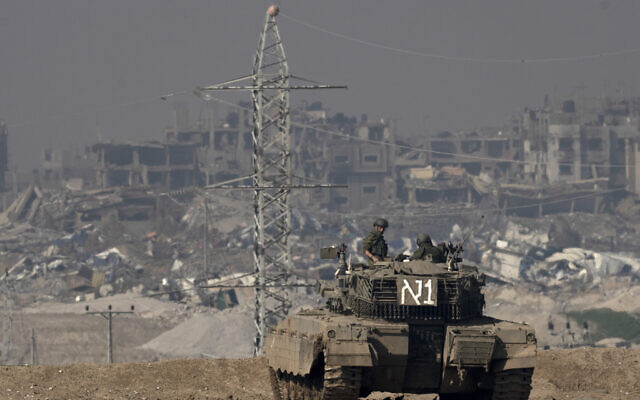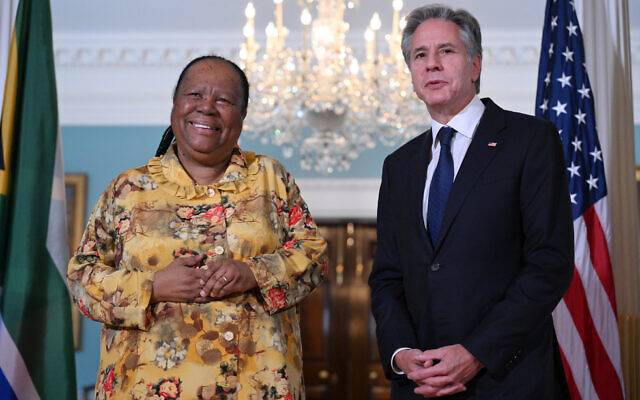17-judge panel due to issue ruling at 2 p.m. Israeli time on whether to order emergency measures against Israel over war on Gaza-ruling Hamas; Blinken speaks to South African FM
UN judges on Friday will rule on South Africa’s request for emergency measures against Israel, which is accused at the World Court of state-led “genocide” for its military operation in Gaza against Hamas.
Friday’s ruling at the International Court of Justice (ICJ) will not deal with the core accusation of the case — whether genocide occurred — but will focus on the urgent intervention sought by South Africa.
Israel declared war following the onslaught, vowing to topple the Gaza-ruling Hamas and return the hostages. According to the Hamas-run health ministry in Gaza, over 25,000 Palestinians have been killed in the Israeli offensive, an unverified figure that includes some 10,000 Hamas operatives that Israel has said it has killed since October 7. More than 200 IDF soldiers have been killed fighting in Gaza.
Israel has asked the court to reject the case outright. An Israeli government spokesperson on Thursday said Israel expects the UN’s top court to “throw out these spurious and specious charges.”
Provisional measures by the world court are legally binding, but it is not clear if Israel would comply with any orders the court might make. Israeli legal experts have largely assessed that the court is highly unlikely to dismiss South Africa’s case altogether, and somewhat unlikely to order a ceasefire in the war, but anticipate a ruling between those extremes. The court could order a host of potential measures including a demand in principle that Israel refrain from genocidal actions, that it take action to prevent harm to civilians, that its leaders refrain from statements inciting genocide, and that it ensure more humanitarian aid for Gaza.
The size of any majority is seen as potentially significant, since a large majority among the 17 judges would give the court’s decision more weight, and substantive demands of Israel backed by a large majority of the judges could prompt pressure on countries supporting Israel to reconsider arms supplies and other economic support.
The court includes judges from Lebanon, Somalia and Morocco who are unlikely to take a supportive stance on Israel, but many on the bench are highly regarded and perceived as independent. South Africa’s judge Dikgang Moseneke, 76, is a retired justice who battled apartheid. Israel’s judge Aharon Barak, 87, a Lithuanian-born Holocaust survivor, is the country’s most renowned jurist and former president of the Supreme Court.
South Africa argued two weeks ago that Israel’s aerial and ground offensive is aimed at bringing about “the destruction of the population” of Gaza.
Israel rejects the accusations as false and libelous, saying it respects international law and has a right to defend itself.

The 17-judge panel will only decide Friday on whether to impose provisional measures and not on the merits of South Africa’s claims. Israel can still challenge the court’s jurisdiction and the admissibility of the case before any subsequent hearings on the legal merits of the case. The US has dismissed the South African case as “meritless” and Germany has said it will argue on Israel’s behalf if and when the court moves on to tackle the core South African allegation of genocide in subsequent hearings.
The court will issue its ruling at 1 p.m. local time (2 p.m. in Israel) in a hearing expected to last about an hour.
South Africa has asked it to issue nine emergency measures, which act like a restraining order while the court hears the case in full, which could take years.
Pretoria wants the court to order a halt to Israeli military action in Gaza, allowing in more humanitarian aid and for Israel to investigate and prosecute possible violations. The court is not bound to follow South Africa’s requests and could order its own measures.
For it to order so-called “provisional measures,” a majority on the 17-judge panel must decide that the court appears to have jurisdiction in the case, that there is a dispute between South Africa and Israel about the 1948 Genocide Convention and that there is an urgent need to order emergency measures while the case continues.
Ahead of the hearing, US Secretary of State Antony Blinken spoke with his South African counterpart Naledi Pandor, who is slated to be in The Hague on Friday.
A readout from the State Department said that during their phone call Thursday, Blinken and Pandor discussed “the conflict in Gaza, including the need to protect civilian lives, ensure sustained humanitarian assistance to Palestinian civilians, and work towards lasting regional peace that ensures Israel’s security and advances the establishment of an independent Palestinian state.”
“The secretary reaffirmed support for Israel’s right to ensure the terrorist attacks of October 7 can never be repeated,” it added.
The statement noticeably did not mention South Africa’s ICJ case, which Blinken has previously called “meritless” and “particularly galling” because “Hamas, Hezbollah, the Houthis and their supporter Iran continue to openly call for the annihilation of Israel and the mass murder of Jews.”
Speaking to reporters earlier Thursday during a tour of Africa that does not include a stop in South Africa, Blinken said “those views stand,” while stressing Washington’s relations with Pretoria would not suffer over the case.
“Of course, our relationship with South Africa is vitally important and it is a very broad and deep relationship covering many, many issues,” Blinken said.
“When we have a disagreement on one particular matter, it doesn’t take away from the important work that we are doing together,” he added.
Also Thursday, the New York Times reported that Israel has declassified more than 30 orders made by government and military leaders, which it says rebut South Africa’s genocide claim and instead show that it is seeking to limit civilian deaths in Gaza.

The documents aim to demonstrate that incendiary comments made by Israeli officials — which South Africa used to argue intent in Jerusalem to commit genocide — played no role in the decision-making.
Part of Israel’s defense is to prove that whatever politicians may have said in public was overruled by executive decisions and official orders from the war cabinet and the military’s command.
“The prime minister stressed time and again the need to increase significantly the humanitarian aid in the Gaza Strip,” reads one declassified document — the minutes from a November 14 cabinet meeting.
At hearings earlier this month, South African lawyers claimed acts by Israel’s military and statements by senior officials demonstrated intent to commit genocide against Palestinians in Gaza.
“The scale of destruction in Gaza, the targeting of family homes and civilians, the war being a war on children, all make clear that genocidal intent is both understood and has been put into practice. The articulated intent is the destruction of Palestinian life,” said lawyer Tembeka Ngcukaitobi.
He said the case’s “distinctive feature” was “the reiteration and repetition of genocidal speech throughout every sphere of the state in Israel.”
L-R: Dr. Tal Becker, Prof. Malcolm Shaw KC, Dr, Gilad Noam, Dr. Galit Raguan attend a hearing in the case brought to the International Court of Justice at The Hague in which South Africa has accused Israel of committing genocide in its war with Hamas in Gaza, January 12, 2024. (International Court of Justice)
Malcolm Shaw, part of Israel’s legal team at hearings in The Hague, rejected the accusation of genocidal intent and called remarks cited by South Africa “random quotes not in conformity with government policy.”
Israeli legal advisor Tal Becker told the court that the country is fighting a “war it did not start and did not want.”
“In these circumstances, there can hardly be a charge more false and more malevolent than the allegation against Israel of genocide,” he added, noting that the horrible suffering of civilians in war was not enough to support an allegation of genocide.
The case strikes at the national identity of Israel, which was founded as a Jewish state after the Nazi slaughter of 6 million Jews during World War II.
Israel is not a member of the ICJ and does not recognize its jurisdiction. However, it is a signatory to the Geneva Convention which gives the ICJ jurisdiction over questions of possible violations of the convention.
The prosecutor of the International Court of Justice (ICC) — a criminal tribunal that prosecutes individuals — has also claimed his court has jurisdiction over potential war crimes carried out by Hamas terrorists in Israel and by Israelis in Gaza. The ICC’s chief prosecutor Karim Khan made a first visit to Israel and the West Bank last month, and said a probe by the court into possible crimes by Hamas terrorists as well as the IDF “is a priority for my office.”
The day after South Africa presented its case to the ICJ in The Hague, Israel’s legal team attacked the fundamental claims of South Africa’s genocide allegations, which contained little mention of the Hamas-led atrocities committed on October 7, with Israel arguing that the “appalling suffering” of civilians, both Israeli and Palestinian, was the result of Hamas’s strategy of hiding behind innocents. Israel called the genocide allegation a malevolent “libel” and said Hamas had declared genocidal ambitions against Israel.
Separately, the ICC has been investigating both Israel and Hamas for alleged war crimes since 2021 and has confirmed that the incidents of October 7 and the ongoing war in Gaza would be examined in the probe.
Source: Times of Israel











